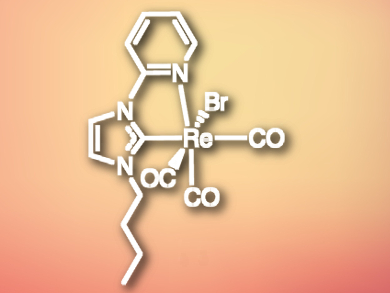Platinum-based anticancer drugs have been at the forefront of cancer treatment. However, they are not a cure-all solution, and patients often suffer from severe side effects. In recent years, the anticancer activity of other metal complexes – mostly those containing gold and ruthenium metal centers – has been investigated. In contrast, rhenium-containing agents (e.g., complexes containing a Re(CO)3 fragment) were not studied as closely despite showing cytotoxic potential.
Peter V. Simpson and Massimiliano Massi, Curtin University, Bentley, Australia, Marco Falasca, Curtin University, Perth, Australia, and colleagues have synthesized Re(CO)3 complexes with N-heterocyclic carbene (NHC) ligands (example pictured). The team tested the activity of the complexes on the cell growth of different pancreatic cancer cell lines.
The half maximal inhibitory concentration (IC50) values of the compounds were smaller than 10 µM, similar to that of the known anticancer agent, carboplatin. These values indicate that the rhenium compounds are remarkably active against the cell lines. The team also tested similar ruthenium complexes with NHC ligands against the pancreatic cancer cell lines, but these compounds were ineffective.
The researchers tried to find the complexes’ mechanism of action and showed that instead of inducing apoptosis, the compounds arrest cell cycle progression. This observation is correlated to the inhibition of Aurora-A kinase phosphorylation, which is an important checkpoint marker in cell cycle progression and a protein that is over-expressed in different tumors. According to the researchers, this class of complexes could have broad application as anticancer drugs.
- Defining the Anti-Cancer Activity of Tricarbonyl Rhenium Complexes: Induction of G2/M Cell Cycle Arrest and Blockade of Aurora-A Kinase Phosphorylation,
Peter V. Simpson, Ilaria Casari, Silvano Paternoster, Brian W. Skelton, Marco Falasca, Massimiliano Massi,
Chem. Eur. J. 2017, 23, 6518–6521.
DOI: 10.1002/chem.201701208




